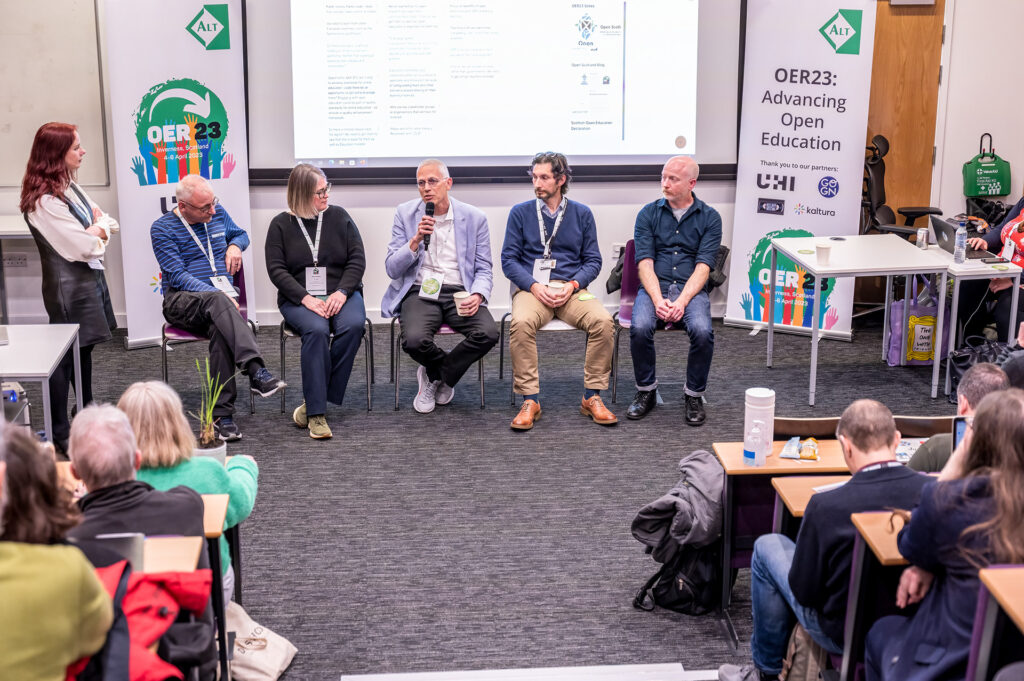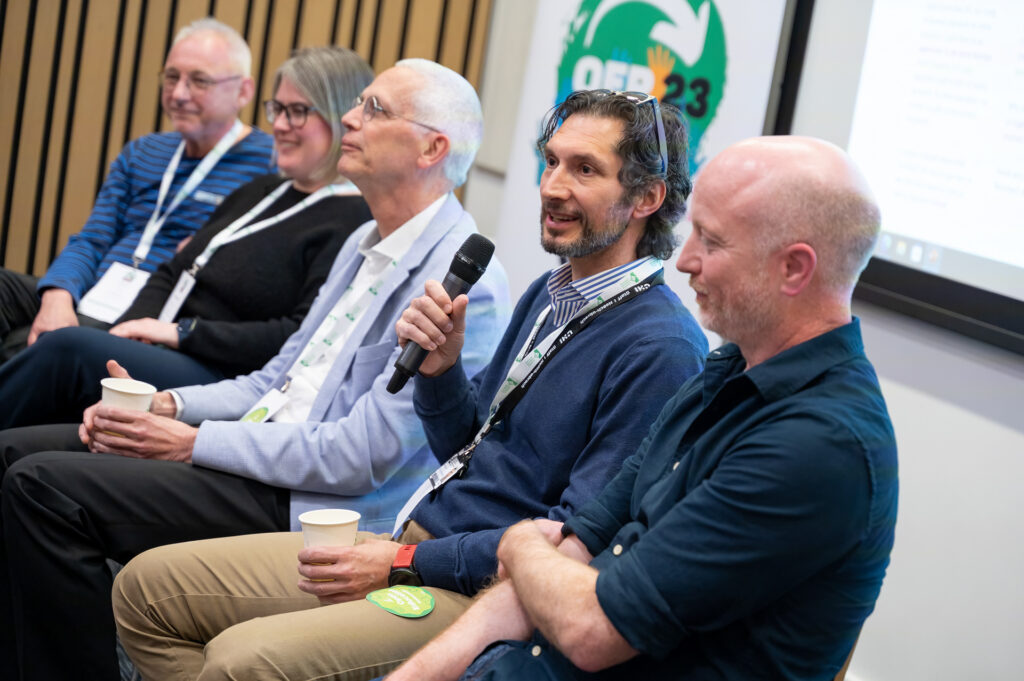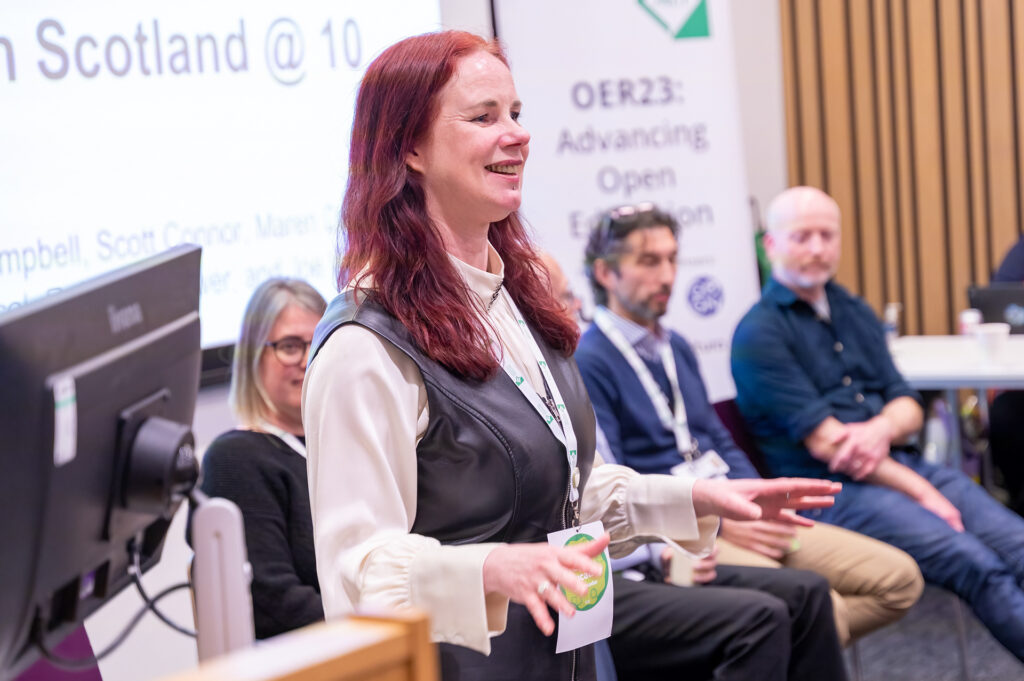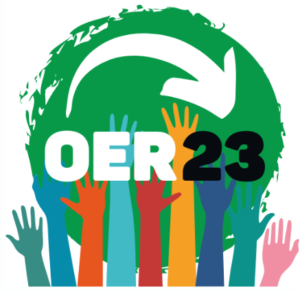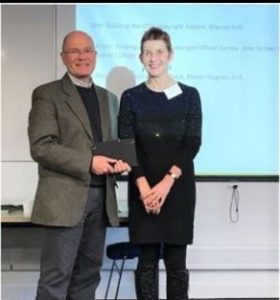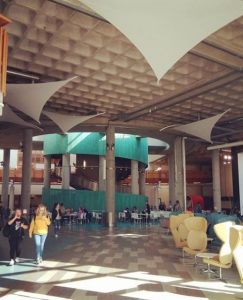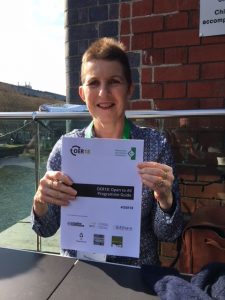For the month of May 2020, Glasgow Caledonian University’s (GCU) Sir Alex Ferguson Library are curating the Open Scotland blog. The topics GCU are presenting provide an insight into the work they do in supporting open practice, open education, and open educational resources.
In our fourth and final post, Senior Library Administrator Seth Thompson returns to present a summary of the findings of his MSc Information and Library Studies dissertation. Seth completed his postgraduate research at Robert Gordon University (RGU) in 2018. His work used a case study methodology to investigate academic library support of OER in Scotland.
Introduction and background
I began working in the library at GCU in January 2015. From a very early stage in my library career I became interested in the idea of open education and open educational resources (OER). I think this was probably because as I began working at GCU I was seeing and hearing about the library’s new edShare@GCU repository and the progress of the GCU OER policy project. As I attended the internal presentations and training sessions about these projects, I realised I had a genuine interest in open practice, the creation of resources that could facilitate future remixing and repurposing, and how these presented opportunities to further knowledge in a time-efficient and cost effective way. I completed my MSc in Information and Library Studies as a distance learner at RGU in 2018. Throughout my studies, openness, resource accessibility, licensing and OERs continued to be of great interest to me. In my final semester at RGU I decided that I could make Higher Education (HE) academic library support of OER in Scotland the topic of my dissertation.
The first step on my dissertation journey was to identify Scottish HE academic libraries that supported OER. I wanted to know if there were other academic libraries that supported OER outside of GCU, how they did this, and what made them want to support an open agenda. To this end, I conducted an environmental scan of all Scottish HE academic library webpages to find which university libraries actively mentioned support for OER. Purposive selection identified three potential cases, with each case providing detailed OER service webpages. I discovered two possible library cases: the Sir Alex Ferguson Library at GCU, and the University of Glasgow library (UoG). I also discovered that the University of Edinburgh (UoE) provided a specific OER support service, Open.Ed.
Stated briefly, the three institutions provide the following support:
The Sir Alex Ferguson Library provides practical support of the GCU OER policy, user support of edShare@GCU, and assistance to staff in resource creation, copyright, intellectual property rights, and licensing enquiries. Further information about our OER services can be found in my previous Open Scotland blog post, on our library website, and edShare@GCU webpages.
UoG provide the ‘EdShare at Glasgow’ repository and copyright, licensing, OER use and creation guidance and training.
Open.Ed support UoE’s OER vision and provide staff and students with advice, guidance and digital skills workshops on OER use and creation, copyright and open licensing, and engagement with open education.
After discussing with my supervisor, I decided that an exploratory multiple case study would be a suitable methodology to use. I used two data collection tools, semi-structured interviews (eight in total across cases) with librarians and staff responsible for OER support, and a thematic case document analysis. My interview questions and document analysis aimed to examine how the cases support OER, why cases wished to support OER, and identify any potential factors affecting each cases’ ability to support OER. At this point it is worth keeping in mind that due to the scale of the project and the use of a case study approach, the results of my research are not generalisable. Though the research may be of interest to libraries and librarians looking to develop strategies and services to support open practices.
Summary of my findings
Five broad themes were identified across cases:
- Academic libraries and HEI department OER support
- Institutional approaches to OER
- Educators and OER
- Approaches to OER service delivery
- Copyright and licensing
Academic libraries and/or department OER support
There was strong consensus across cases that academic libraries and/or departments within HEIs should support OER. In line with good open practice, all cases highlighted a desire for co-creation in service delivery. Collaboration is identified as an enabling factor to library OER projects (Bueno-de-la-Fuente et al. 2012; Smith and Lee 2017), with OER seen as a catalyst for improved collaboration (McGill et al. 2013).
Each case displayed strong affinity with open practice and stated their reasons to support OER as including:
- Supporting digital education
- Showcasing educator teaching materials
- Developing educator digital and information literacy skills
- Supporting student learning through diversifying curriculums and cost reduction
- To develop educator copyright and licensing knowledge to enhance teaching resources and protect institution copyright integrity
However, cases also highlighted tensions with educators and departments within OER projects and initiatives. This is concurrent with tension identified by McGill et al. (2015) when attempting to collectively develop OER.
Institutional approaches to OER
Each case identified differing levels of institutional support. Institutional OER approaches may incorporate funding, policy, senior and local management support and social culture, with each of these elements potentially impacting factors upon service success. Within HEIs institutional budgets may be key to OER funding and success (Mulder 2013; Barrett et al. 2009). Institutional conditions such as those found at Open.Ed, which included central funding, non-coercive policy, senior and departmental support, and high availability of educator and student support mechanisms, may assist in presenting an environment which is seen to motivate educator agency and OER decisions. Soft or flexible OER policies may gently encourage educator OER use (Nikoi and Armellini 2012; UNESCO 2011). Though policy may not singularly ensure sustainable OER practice (Cox and Trotter 2016), it may assist in clarifying issues of copyright, licensing and IP ownership (Gadd and Weedon 2017). Building an institutional OER culture may benefit from both student and staff involvement, as demonstrated at Open.Ed. Perceived conflicts between institutional support of research and institutional support of OER were suggested by participants at GCU and UoG. This is concurrent with Cox (2013). There is a lack of research discussing motivators to produce OER in relation to excellence frameworks such as the Research Excellence Framework (REF) or Teaching excellence Framework (TEF). A lack of external motivators, such as professional incentives or recognition for creating OER, may also be a barrier to OER services.
Educators and OER
Educators professional relationship with OER was identified as a major impacting factor upon case OER services. Identified issues included resource proprietary, fear of judgement and anxiety regarding resource quality. All case concerns are not dissimilar to issues previously identified (Cox 2013; Beggam 2010; Sefton 2010). The lack of OER awareness amongst educators at each case was comparable to de los Arcos et al. (2016). However, in drawing together Cox and Trotter (2016) and Anderson’s (2010) findings, presenting a collegiate institutional culture that values opportunities for educators to freely engage with OER and exhibit high levels of OER agency may assist in encouraging OER use. Interviewee responses at Open.Ed suggested that an open collegiate culture such as this may be present. GCU and UoG participants reflectively questioned whether their services offering addressed the pedagogical needs of educators. Educator use of OER services without the creation of OER in mind may present a gap in knowledge and literature, particularly in OER repository services. If the option to share materials as OER is present, why are educators not choosing to do so? This may present evidence concurrent with the findings of Cronin, who found that performing open practice is a complex, personal and contextual decision that is continually negotiated (2017). A key OER support consideration is that educator attitudes to sharing and borrowing may be deeply rooted in professional and individual feelings (Rolfe 2012).
Approaches to service delivery
Open.Ed, GCU and UoG concurred in identifying a need to develop educator OER awareness and knowledge to encourage use (Smith and Lee 2017; de los Arcos et al. 2016; Cox 2013; Murphy 2013). However, cases presented contrasting approaches to services. GCU and UoG focused on repository services. Open.Ed focused on skills training. Both GCU and UoG highlight a lack of staff time and resource as a factor impacting upon abilities to deliver training and advocacy services. Time is acknowledged as a barrier to librarian OER support (Smith and Lee 2017; Okamoto 2013). Open.Ed’s focus toward developing digital skills identifies with research that suggests developing technical skills may encourage OER use (Anderson 2010) and counteract potential for digital skills gaps (Jisc n.d.). Open.Ed expressed different feelings towards institutional OER repositories than library service cases GCU and UoG, with Open.Ed being more inclined to resources being shared on broader social platforms such as YouTube, Flickr etc. as they felt that this may be more accessible. There would appear to be benefits to sharing using institutional repositories (Atenas and Havemann 2014) and sharing online on social platforms (Rolfe 2016). However, institutional repository sustainability may be dependent on funding and institutional approaches to openness. Therefore, budgets may be key (Mulder 2013). As stated, GCU Interviewees reflectively considered if OER services have fulfilled educators’ pedagogical requirements, and if future services could have greater focus toward educators’ needs. This would appear to agree with Ferguson’s statement that for academic libraries to continue to take part in OER conversations, such as those regarding creation, storage, preservation and versioning, they must adapt to the needs of departments, staff and students (2017).
Copyright and licensing
GCU, Open.Ed and UoG all identified a lack of educator copyright and open licensing knowledge, thus concurring with previous open practice research (de los Arcos et al. 2016). Services provided by all cases attempt to increase copyright competency. Findings identified that cases experiencing copyright predominantly in three of the framed contexts described by Morrison and Secker: as a problem, a recognised entity, and as an opportunity (2017). However, all cases presented evidence to suggest their experiences of educator copyright interactions provided opportunities to develop knowledge and understanding. In concurrence with Kleemeyer et al. (2010), Borchard and Magnussen (2017), and Smith and Lee (2017), evidence presented may suggest that librarians and OER support staff interviewed possess copyright and licensing skills that could be an enabler in OER support. Furthermore, copyright discussions with educators at Open.Ed are considered to have facilitated conversations around accessibility, diversity, inclusion, approaches to diversifying curriculums, and student collaborations. Good copyright and licensing practice are required from the start of OER creation processes to mitigate against retrospect resource checking and ‘copyright debt’ and can increase ways materials can be used in the future.
What can libraries do to improve OER support?
The following section provides a summary of my recommendations for each of the themes that were identified across cases.
Academic libraries and HEI department OER support
As mentioned, there was strong consensus that academic libraries and/or departments within HEIs should support OER. Libraries looking to support OER should look to create OER themselves. This was identified at each case and may set an example to educators. Each case sought collaboration to improve their service delivery. Collaboration can enable OER projects, whilst OER is a catalyst for collaboration, therefore libraries may wish to utilise OER within co-creative projects in attempts to improve projects and enhance collaborations. A multitude of reasons for supporting OER are presented by cases. If libraries are considering supporting OER, it may be beneficial to state agreed missions, objectives, and goals to focus service scope as this may guard against tensions such as those identified by McGill et al. (2015).
Institutional approaches to OER
Libraries may wish to consider lobbying senior executives to deliver an OER support statement. This may include policy development or OER inclusion in support frameworks. Policy documents are available as OER (for example GCU, Open.Ed and University of Leeds) which can be adapted to suite needs. However, it may not be advisable to solely rely on policy as a driver for OER. Libraries should consider their institutional culture and if OER philosophies reflect their institutional mission and vision. Libraries may wish to consider encouraging educators to think about open practice, as supportive collegiate culture may foster an environment within which educators feel free to exhibit high levels of OER agency (Cox and Trotter 2016). Student engagement with OER may also enable the transformative potential of OER (UNESCO 2011). Engaging with the student voice may provide service development opportunities as evidenced at Open.Ed. Acknowledging OER created by educators through social websites may represent an opportunity to address barriers such as a lack of recognition (Jhangiani et al. 2016; Cox 2013; Alevizou 2012). Libraries could consider utilising networks within academic departments to highlight UNESCO (2011) recommendations to position OER within professional development objectives, as this may also address professional incentive barriers (Alevizou 2012).
Educators and OER
Natural sharing instincts may be complex (Cronin 2017; Rolfe 2012) and potentially not easily modified (Anderson 2010). However, moral standing may be influenced by cultural surroundings (Anderson 20120). Therefore, it is recommended libraries looking to support OER create environments that value open practice and social responsibility which may boost educator attitudes to sharing. Solutions proposed by GCU and Open.Ed to educate staff in CC licenses, whilst reinforcing that OER are adaptable resources, are recommended to address loss of control and fear of resource quality judgement. As previously stated, libraries should consider utilising academic department networks to highlight UNESCO (2011) recommendations of OER within professional development objectives. This may also present career enhancing opportunities as identified by Rolfe (2012) and Browne et al. (2010), which may encourage OER use. Further research is recommended to investigate if OER services meet the pedagogical needs of educators, and examine why educators may engage with OER services, particularly repositories, yet not release materials as OER.
Approaches to OER service delivery
If libraries are looking to support OER, developing services that advocate OER benefits (Weller et al. 2015; McGill et al. 2013) and enhance educator knowledge, understanding and digital skills relating to OER and associated concepts such as copyright and CC licensing may be key to success. Academic libraries should also consider both institutional repositories and online social platform hosting. However, consultation with educators to establish OER related needs is critical to ensuring service developments reflect institutional and educator pedagogical needs.
Copyright and licensing
From case findings, facilitating copyright and licensing understanding amongst educators may be an ongoing task which requires continual support. Librarians may require training to support educators’ OER needs relating to copyright and licensing. Copyright and licensing service offerings should aim to empower staff with knowledge to guard against possible future ‘copyright debt’ and retrospective OER copyright and license checking.
In closing, and how to contact us
Under the guidance of my dissertation supervisor, an article version of my research which focuses on the two library cases is available from both the RGU and GCU research repositories. I also presented a poster about the case study findings of my dissertation at OER19 under the theme ‘Back to basics – Asking difficult questions about Open Education’.
If you would like to get in touch about anything mentioned in my blog or any our previous posts this month, please feel free to contact us edshare@gcu.ac.uk or me personally on Twitter. Finally, and on behalf of the Sir Alex Ferguson Library, I would like to say thank you to Open Scotland and the Open Scotland blog team for providing us with the opportunity to guest curate the blog during May 2020. It has been a really enjoyable experience for everyone involved at GCU, and during the current Covid-19 crisis has provided a welcome and fulfilling opportunity for creative output.
Seth Thompson
@sthom_23
References
ALEVIZOU, P., 2012. Open to interpretation? productive frameworks for understanding audience engagement with OER. In: Cambridge 2012: Innovation and Impact – Openly Collaborating to Enhance Education, a Joint Meeting of OER12 and OpenCourseWare Consortium Global 2012. Cambridge, 16-18 April 2012. [online]. Available at: http://oro.open.ac.uk/33452/ [Accessed 17 December 2017].
ATHENAS, J. and HAVEMANN, L., 2014. Questions of quality in repositories of open educational resources: a literature review. Research in Learning Technology, 22(1), 20889.
ANDERSON, M.H., 2010. To share or not to share: is that the question? EDUCAUSE Review, 45(4), pp. 40-49.
BARRETT, B., GROVER, V., JANOWSKI T., VAN LAVIERENA, H., OJOA, A. and SCHMIDTA, P., 2009. Challenges in the adoption and use of OpenCourseWare: Experience of the United Nations University. Open Learning, 24(1), pp. 31-38.
BEGGAN, A., 2010. Opening Up: staff attitudes to open learning. [PowerPoint presentation]. OCW Consortium Global, Hanoi, Vietnam. Available from: https://www.slideshare.net/AndyBeggan/opening-up-staff-attitudes-to-open-learning [Accessed 16 September 2018].
BORCHARD, L. and MAGNUSON, L., 2017. Library leadership in open educational resource adoption and affordable learning initiatives. Urban Library Journal, 23(1), Article 1.
BUENO-DE-LA-FUENTE G., ROBERTSON, R.J. and BOON, S., 2012. The roles of libraries and information professionals in Open Educational Resources (OER) initiatives: survey report. JISC Cetis.
COX, G., 2013. Researching resistance to open education resource contribution: an activity theory approach. E-Learning and Digital Media, 10(2), pp. 148-159.
COX, G. and TROTTER, H., 2016. Institutional culture and OER policy: how structure, culture, and agency mediate OER policy potential in South African universities. International Review of Research in Open and Distributed Learning, 17(5), pp. 147-164.
CRONIN, C., 2017. Openness and Praxis: Exploring the Use of Open Educational Practices in Higher Education. International Review of Research in Open and Distributed Learning, 18(5), pp. 15-34.
DE LOS ARCOS, B., CANNELL, P. and MCILLWHAN, R., 2016. Awareness of open educational resources (OER) and open educational practice (OEP) in Scottish higher education institutions: survey results: interim report. Edinburgh: Opening Educational Practices in Scotland.
FERGUSON, C.L., 2017. Open educational resources and institutional repositories. Serials Review, 43(1), pp. 34-38.
GADD, G. and WEEDON, R., 2017. Copyright ownership of e-learning and teaching materials: policy approaches taken by UK universities. Education and Information Technologies, 22(6), pp. 3231-3250.
JHANGIANI, R., PITT, R., HENDRICKS, C., KEY, J., and LALONDE, C., 2016. Exploring faculty use of open educational resources at British Columbia post-secondary institutions. BCcampus research report. [online]. Victoria, BC: BCcampus. Available from: https://bccampus.ca/files/2016/01/BCFacultyUseOfOER_final.pdf [Accessed 6 January 2017].
KLEEMEYER, P., KLEINMAN, M. and HANSS, T. 2010. Reaching the heart of the university: libraries and the future of OER. In: Open ED 2010 Proceedings. Barcelona, 2-4 November 2010, UOC, OU, BYU, pp. 241-250.
MCGILL, L., FALCONER, I., DEMPSTER, J.A., LITTLEJOHN, A. and BEETHAM, H., 2013. Journeys to open educational practice: UKOER/SCORE review final report. [online]. JISC. Available from: https://oersynth.pbworks.com/w/page/60338879/HEFCE-OER-Review-Final-Report [Accessed 5 January 2017].
MORRISON, C.M and SECKER, J., 2017. Understanding librarians’ experiences of copyright: findings from a phenomenographic study of UK information professionals. Library Management, 38(6/7), pp. 354-368.
MULDER, F., 2013. The LOGIC of national policies and strategies for open educational resources. The International Review of Research in Open and Distance Learning, 14(2), pp. 97-105.
MURPHY, A., 2013. Open educational practices in higher education: institutional adoption and challenges. Distance Education, 34(2), pp. 201-217.
NIKOI, S. and ARMELLINI, A., 2012. The OER mix in higher education: purpose, process, product, and policy. Distance Education, 33(2), pp. 37-41.
OKAMOTO, K., 2013. Making higher education more affordable, one course reading at a time: academic libraries as key advocates for open access textbooks and educational resources. Public Services Quarterly, 9(4), pp. 267-283.
ROLFE, V., 2012. Open educational resources: staff attitudes and awareness. Research in Learning Technology, 20(1), 14395.
ROLFE, V., 2016. Web strategies for the curation and discovery of open educational resources. Open Praxis, 8(4), pp. 297-312.
SEFTON, P., 2010. My Fave Two Reasons not to Release OpenCourseware. [online]. 12 August 2010. Available from: http://ptsefton.com/2010/08/12/my-fave-two-reasons-not-to-release-opencourseware.htm [Accessed 16 September 2018].
SMITH, B. and LEE, L., 2017. Librarians and OER: cultivating a community of practice to be more effective advocates. Journal of Library and Information Services in Distance Learning, 11(1-2), pp.106-122.
UNESCO, 2011. Guidelines for Open Educational Resources (OER) in Higher Education. Paris: UNESCO and Commonwealth of Learning.
WELLER, M., DE LOS ARCOS, B., FARROW, R., PITT, B. and MCANDREW, P., 2015. The impact of OER on teaching and learning practice. Open Praxis, 7(4), pp. 351-361.
YIN, R.K., 2018. Case study research and applications: design and methods. 6th ed. Thousand Oaks: SAGE.

